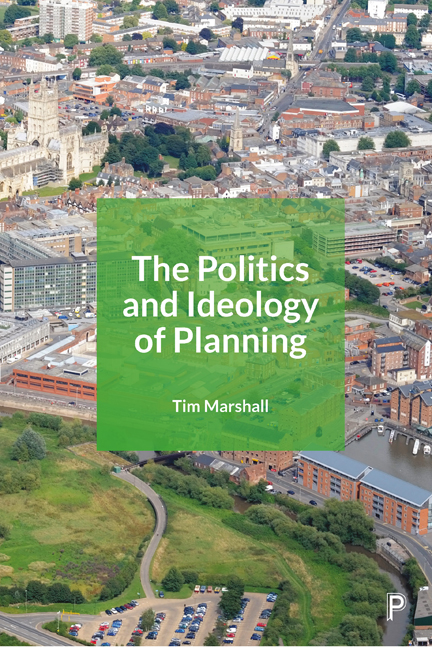Book contents
- Frontmatter
- Contents
- List of figures and tables
- List of abbreviations
- Acknowledgements
- 1 Introducing planning, politics and ideology
- 2 Writing on politics and ideology in planning
- 3 Ideologies in Britain, with initial linking to planning
- 4 Planning history, planning reform and politics and ideology
- 5 Planning expertise and planning law: autonomy from politics and ideology?
- 6 Ideology and politics in government, central and local
- 7 Ideology and politics in professions, lobbying, consultancies and pressure groups
- 8 Communication, the media and deliberation
- 9 Facets of planning action: heritage, local environment and design
- 10 Fields of planning action: housing, economy and infrastructure
- 11 Paths to improving the ideological and political dimensions of planning
- References
- Index
8 - Communication, the media and deliberation
Published online by Cambridge University Press: 05 January 2022
- Frontmatter
- Contents
- List of figures and tables
- List of abbreviations
- Acknowledgements
- 1 Introducing planning, politics and ideology
- 2 Writing on politics and ideology in planning
- 3 Ideologies in Britain, with initial linking to planning
- 4 Planning history, planning reform and politics and ideology
- 5 Planning expertise and planning law: autonomy from politics and ideology?
- 6 Ideology and politics in government, central and local
- 7 Ideology and politics in professions, lobbying, consultancies and pressure groups
- 8 Communication, the media and deliberation
- 9 Facets of planning action: heritage, local environment and design
- 10 Fields of planning action: housing, economy and infrastructure
- 11 Paths to improving the ideological and political dimensions of planning
- References
- Index
Summary
We have now looked at the functioning of planning from a range of perspectives – historically, the significance of technical and legal perspectives, the forces acting inside and outside government at different levels. Next it is important to put the spotlight on processes of communication, mediation and deliberation. If we are trying to imagine a democratic process of good government, such as would give reasonable chances for beneficial planning, we would naturally put some stress on how citizens get to know what is going on. In the terms of Habermas, we are thinking about the quality of the public sphere, national as well as local. How well does this public sphere work for planning, so that citizens interested in any aspect of planning, general or very local, can know what is happening? The impression gained by the Raynsford Review in 2017– 18 was that the answer was, not too well, given the discontent expressed by many outside the planning profession. So it is important to think about what the conditions may be for a better-functioning public sphere. In relation to the Chapter 1 framing, these issues of communication and deliberation are key ‘political and ideological dimensions of planning’, as should become clear in this chapter.
All public policy depends on communication in some kinds of public sphere, for the possibility of democratic or at least reasonably wide-scale debate to take place. But planning, due to its continuously evolving and variously scaled nature, and the strong and often obvious implications for the numerous and varied interests, may be even more dependent on forms of communication media than, say, are the health or education policy fields. If no one knows of a development scheme, or even if people know only unreliable rumours, the possibility of meaningful engagement by citizens is minimal.
These questions of open policy making form part of ideological strategies of those in power, in this case sometimes to limit available information and reduce participatory and deliberative spaces. This has been evident in many UK governmental instances in recent years, as in the Planning Act 2008 centralising of decision making on major infrastructure and the abolition of regional and strategic planning in 2011, effectively centralising what public control existed at these levels into central ministries and obscure deal-making processes in LEPs and similar business-and elite-led bodies.
- Type
- Chapter
- Information
- The Politics and Ideology of Planning , pp. 159 - 180Publisher: Bristol University PressPrint publication year: 2020



